| |||||
| Decades: | |||||
|---|---|---|---|---|---|
| See also: | |||||
The following lists events that happened during 2014 in Madagascar .
| |||||
| Decades: | |||||
|---|---|---|---|---|---|
| See also: | |||||
The following lists events that happened during 2014 in Madagascar .
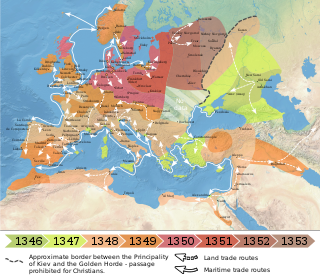
The Black Death was a bubonic plague pandemic that occurred in Europe from 1346 to 1353. It was one of the most fatal pandemics in human history; as many as 50 million people perished, perhaps 50% of Europe's 14th century population. The disease is caused by the bacterium Yersinia pestis and spread by fleas and through the air. One of the most significant events in European history, the Black Death had far-reaching population, economic, and cultural impacts. It was the beginning of the second plague pandemic. The plague created religious, social and economic upheavals, with profound effects on the course of European history.

Plague is an infectious disease caused by the bacterium Yersinia pestis. Symptoms include fever, weakness and headache. Usually this begins one to seven days after exposure. There are three forms of plague, each affecting a different part of the body and causing associated symptoms. Pneumonic plague infects the lungs, causing shortness of breath, coughing and chest pain; bubonic plague affects the lymph nodes, making them swell; and septicemic plague infects the blood and can cause tissues to turn black and die.

Madagascar, officially the Republic of Madagascar, is an island country comprising the island of Madagascar and numerous smaller peripheral islands. Lying off the southeastern coast of Africa, it is the world's fourth largest island, the second-largest island country and the 46th largest country in the world. Its capital and largest city is Antananarivo.

1665 (MDCLXV) was a common year starting on Thursday of the Gregorian calendar and a common year starting on Sunday of the Julian calendar, the 1665th year of the Common Era (CE) and Anno Domini (AD) designations, the 665th year of the 2nd millennium, the 65th year of the 17th century, and the 6th year of the 1660s decade. As of the start of 1665, the Gregorian calendar was 10 days ahead of the Julian calendar, which remained in localized use until 1923.

Pneumonic plague is a severe lung infection caused by the bacterium Yersinia pestis. Symptoms include fever, headache, shortness of breath, chest pain, and coughing. They typically start about three to seven days after exposure. It is one of three forms of plague, the other two being septicemic plague and bubonic plague.

Locusts are various species of short-horned grasshoppers in the family Acrididae that have a swarming phase. These insects are usually solitary, but under certain circumstances they become more abundant and change their behaviour and habits, becoming gregarious. No taxonomic distinction is made between locust and grasshopper species; the basis for the definition is whether a species forms swarms under intermittently suitable conditions; this has evolved independently in multiple lineages, comprising at least 18 genera in 5 different subfamilies.
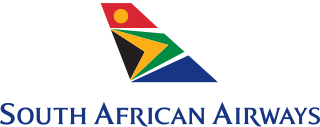
South African Airways (SAA) is the flag carrier of South Africa. Founded in 1934, the airline is headquartered in Airways Park at O. R. Tambo International Airport in Johannesburg and operates a hub-and-spoke network, serving 13 destinations in Africa and two intercontinental destinations to Perth, Australia and São Paulo, Brazil. The carrier joined Star Alliance in April 2006, making it the first African carrier to sign with one of the three major airline alliances.

Goodluck Ebele Azikiwe Jonathan is a Nigerian politician who served as the president of Nigeria from 2010 to 2015. He lost the 2015 presidential election to former military head of state General Muhammadu Buhari and was the first incumbent president in Nigerian history to concede defeat in an election and therefore allow for a peaceful transition of power.

Bubonic plague is one of three types of plague caused by the bacterium Yersinia pestis. One to seven days after exposure to the bacteria, flu-like symptoms develop. These symptoms include fever, headaches, and vomiting, as well as swollen and painful lymph nodes occurring in the area closest to where the bacteria entered the skin. Acral necrosis, the dark discoloration of skin, is another symptom. Occasionally, swollen lymph nodes, known as "buboes", may break open.

Andry Nirina Rajoelina is a Malagasy-French politician and businessman who has served as president of Madagascar since 2023. He previously served as president from 2019 to 2023, and was president of a provisional government from 2009 to 2014 following a political crisis and military-backed coup, having held the office of Mayor of Antananarivo for one year prior. Before entering the political arena, Rajoelina was involved in the private sector, including a printing and advertising company called Injet in 1999 and the Viva radio and television networks in 2007.
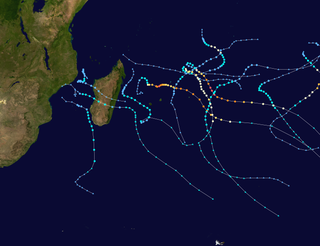
The 2014–15 South-West Indian Ocean cyclone season was an above average event in tropical cyclone formation. It began on November 15, 2014, and ended on April 30, 2015, with the exception for Mauritius and the Seychelles, for which it ended on May 15, 2015. These dates conventionally delimit the period of each year when most tropical and subtropical cyclones form in the basin, which is west of 90°E and south of the Equator. Tropical and subtropical cyclones in this basin are monitored by the Regional Specialised Meteorological Centre in Réunion.
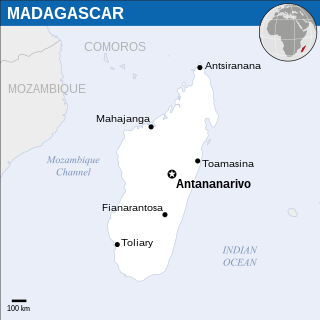
Madagascar has experienced several outbreaks of bubonic and pneumonic plague in the 21st century. In the outbreak beginning in 2014, 71 died; in 2017, 202 died. Smaller outbreaks occurred in January 2008, and December 2013.
Globally about 600 cases of plague are reported a year. In 2017 and November 2019 the countries with the most cases include the Democratic Republic of the Congo, Madagascar, and Peru.
The following lists events that happened during 2020 in East Africa. The countries listed are those described in the United Nations geoscheme for East Africa: Burundi, Comoros, Djibouti, Eritrea, Ethiopia, Kenya, Madagascar, Malawi, Mauritius, Mayotte, Mozambique, Réunion, Rwanda, Seychelles, Somalia, South Sudan, Tanzania, Uganda, Zambia, Zimbabwe.
The COVID-19 pandemic in Madagascar is part of the ongoing worldwide pandemic of coronavirus disease 2019 caused by severe acute respiratory syndrome coronavirus 2. On 20 March 2020, the first case in Madagascar was confirmed in Antananarivo.
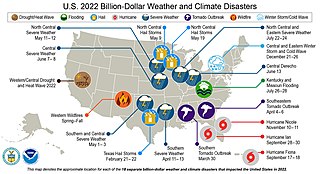
The following is a list of weather events that occurred on Earth in the year 2022. The year began with a La Niña. There were several natural disasters around the world from various types of weather, including blizzards, cold waves, droughts, heat waves, wildfires, floods, tornadoes, and tropical cyclones. The deadliest weather event of the year were the European heat waves, which killed over 26,000 people, 11,000 of which were in France. The costliest weather event of the year was Hurricane Ian, which caused at least $112.9 billion in damages in Florida and Cuba. Another significant weather event was the Pakistan floods, which killed 1,739 people and a total of $14.9 billion in damages.
The following is a list of weather events in 2019.

Throughout 2022, floods affected most of Africa, killing over 2,100 people. The worst affected country was Nigeria, with over 610 deaths.